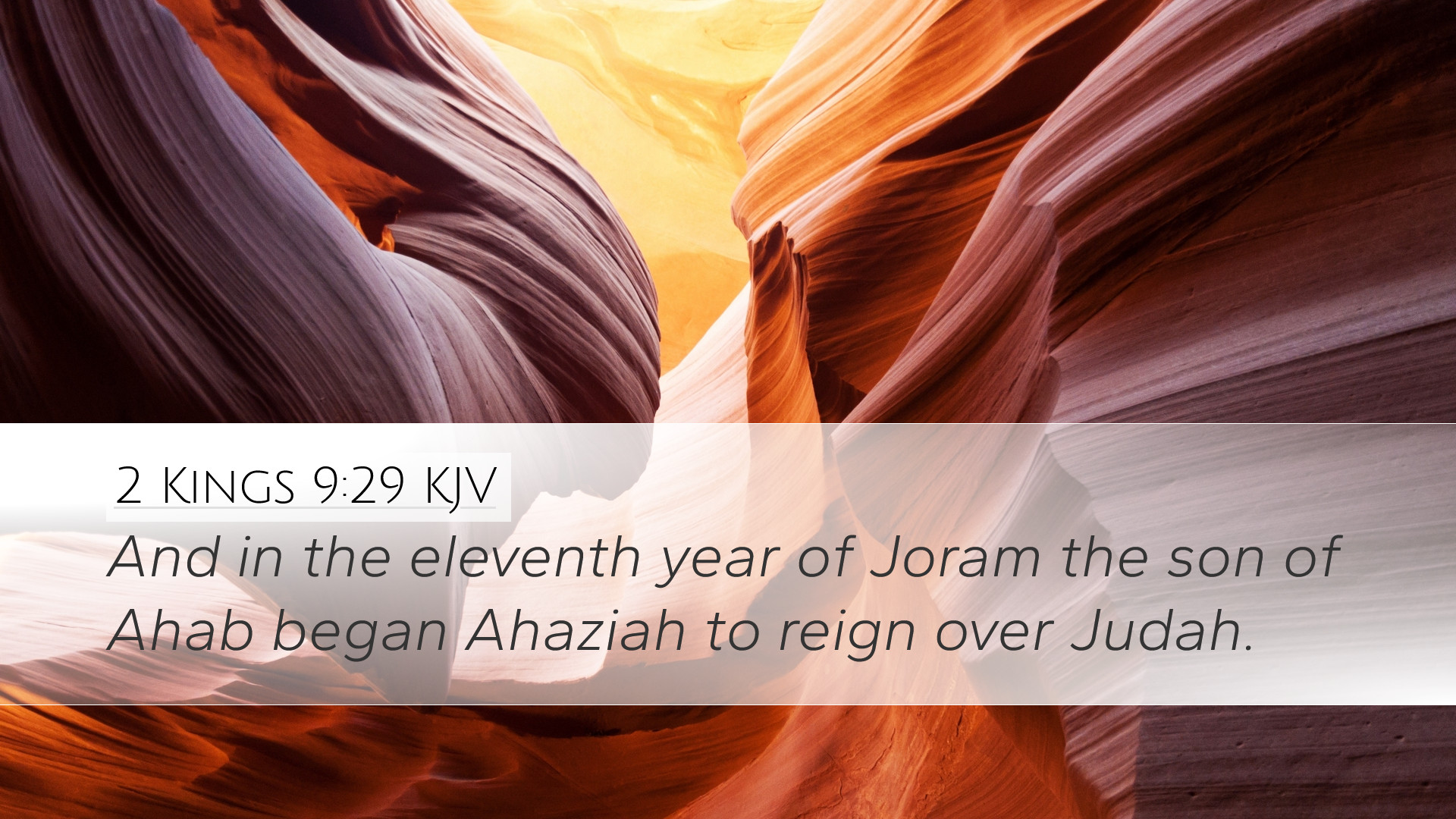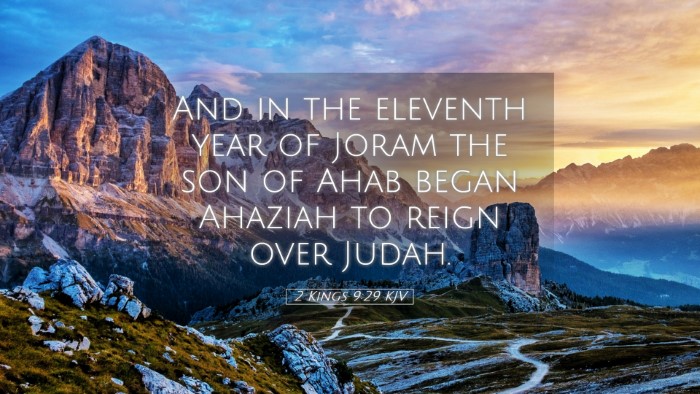Commentary on 2 Kings 9:29
Verse: "And in the eleventh year of Joram the son of Ahab began Ahaziah to reign over Judah." (2 Kings 9:29, KJV)
Introduction
This passage marks a pivotal moment in the history of Israel and Judah, encapsulating the decline of the house of Ahab and the complexities of the related dynasties. Understanding this verse requires a deep dive into the historical context, the characters involved, and the theological implications that arise from the shifting leadership in both kingdoms.
Historical Context
The verse situates itself within a broader narrative of political intrigue and divine judgment during the divided monarchy, particularly in the 9th century BC. The statement, “in the eleventh year of Joram the son of Ahab,” provides a timeline for scholars and theologians as they explore the reigns of kings in Israel and Judah.
Commentary Insights
- Matthew Henry: Henry emphasizes the significance of this timeline, noting that it underscores the divine providence governing the rise and fall of kings. The mention of Ahaziah's ascendance in such a manner reflects God's sovereignty even over the actions and fates of rulers.
- Albert Barnes: Barnes highlights the interrelation between the kingdoms of Israel and Judah. Joram’s reign in Israel is pivotal, illustrating the continuing influence of the house of Ahab, even as Ahaziah begins his reign. This conveys both political alliances and the consequences of idolatry rooted in the Ahab dynasty.
- Adam Clarke: Clarke focuses on the implications of Ahaziah's short and troubled reign. He correlates the events leading to Ahaziah’s rule with the prophetic judgments pronounced against Ahab's lineage due to their idolatry and wickedness, suggesting that Ahaziah’s reign could not escape the fallout of his predecessor’s sins.
Theological Implications
The ascension of Ahaziah raises important theological questions about the nature of leadership, the effects of familial sin, and the overarching narrative of divine justice.
Divine Justice
In this passage, we observe the continuation of divine judgment against the house of Ahab. The narrative does not merely serve as a historical record but as a reminder of the ethical realities underpinning the monarchy in ancient Israel. Each king's story illustrates the moral and spiritual ramifications of their choices.
Leadership and Influence
This verse also invites reflection on the nature of leadership, particularly in a theocratic context. Ahaziah's succession symbolizes not just a transfer of power but also a perpetuation of a legacy steeped in idolatry and moral decay. Pastors and theologians might consider how the leaders of today impact the faith and practices of their communities.
The Role of Prophecy
Throughout the annals of the kings, the prophetic voice plays a crucial role. The context surrounding Ahaziah’s reign and the prophetic declarations preceding it set a stage for God's unfolding plan. The prophetic tradition serves as a reminder of accountability to divine standards, which are central to the narrative of Israel’s monarchy.
Comparative Analysis
- Joram and Ahaziah: Joram’s reign is marked by a battle against Aramean aggression and internal strife, while Ahaziah’s brief rule is largely characterized by failure and subsequent judgment, illustrating the dichotomy of kingship in Judah confronted with Israel’s troubling legacy.
- The House of Ahab: The lasting impact of Ahab’s choices has consequences that outlive individual reigns, manifesting in national character and spiritual condition, which echoes the themes of corporate responsibility and generational sin seen throughout scripture.
Conclusion
In 2 Kings 9:29, we see more than a mere chronological marker; we see an intersection of history, prophecy, and divine purpose. The reign of Ahaziah, marked by its brevity and connection to Joram’s reign, is a narrative steeped in the themes of accountability, judgment, and the unwavering sovereignty of God. For modern readers, this passage offers a profound reminder of the influence of leadership, the legacy of sin, and the necessity of prophetic voices calling for righteousness in tandem with the unfolding story of redemption.


